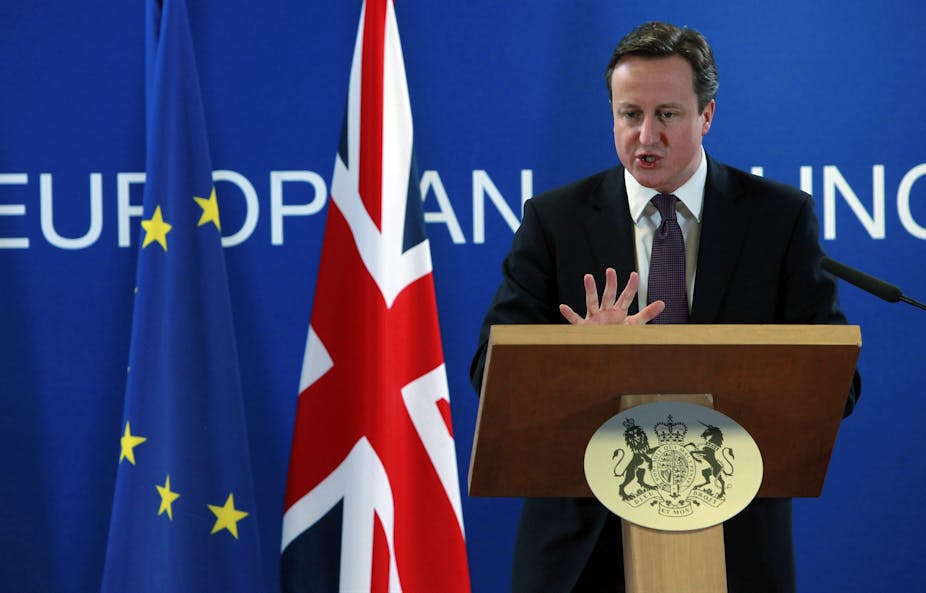British Prime Minister David Cameron’s decision to veto the new European Union agreement for greater financial stability in the Eurozone reminds us that despite the talk of greater European integration, the nation state is still very much alive and well.
Odd one out
The agreement, a Franco-German initiative, was meant to create mechanisms for greater fiscal oversight for European institutions such as the European Central Bank, to be monitored by the European Courts of Justice.
Other Eurozone members went along with it, but they didn’t have much choice. In the end, 26 out of the 27 EU members states also agreed to the package.
The key 27th “you-know-who” member left out of the agreement was, of course, the UK. This meant the deal was “restricted” to the Eurozone of 17 member-states who use the Euro, and the other 9 member states who may adopt it in the future.
Hard politics
David Cameron was in a difficult position, but ultimately used his veto to block the proposed changes. His situation was difficult because he was stuck between the competing imperatives of “domestic” and “European” politics, although in truth, it is getting harder to distinguish between the two.
For a start, Cameron’s Conservatives are in a coalition with Nick Clegg’s Liberal Democrats, the most pro-European of all the UK’s major political parties. The Conservatives, on the other hand, are the most eurosceptic of the UK’s major political parties and indeed, one of the most important eurosceptic parties throughout Europe.
In negotiating the Franco-German proposals for Eurozone stability in Brussels, Cameron was severely restricted by politics at home. The stated reasons for rejecting the Eurozone pact were about the inappropriateness of the scheme for UK financial services, but we need to look back over the politics of Europe within the Coalition government for a deeper understanding of why Cameron used his veto.
No choice left
In July 2011, the European Union Act received Royal Assent. This did two important things: it enshrined the principle of parliamentary sovereignty in UK law and it provided for a “referendum lock” on any further transfer of power from the UK to the EU.
The first point is that the law now recognises that all EU law is ultimately brought about by parliament even if EU law has supremacy. The second bolsters parliamentary sovereignty with popular sovereignty, thereby undermining the very principle the act seeks to uphold.
This is where Cameron’s hands were tied.
If a new treaty was agreed at Brussels, then the UK would have to endorse this governmental decision via a popular referendum; which (given the current extent of euroscepticism in British and especially English politics) is to say it would fail.
But this is why the European Union Act was brought about in the first place. With a broadly eurosceptic public and virulently eurosceptic press behind him, Cameron could do no other than reject the stability proposal.
But was this a case of “splendid isolation” or “continent stranded”?
Almost European

This crisis-within-a-crisis has been some decades in the making; from the Labour Party’s difficulties with European integration in the 1970s to the Conservatives’ own intra-party divisions from the late 1980s.
Some committed Europeans, such as Jürgen Habermas, have been speaking about the existence of a “core” and “non-core” Europe for a long time. Former US secretary of Defence Donald Rumsfeld himself was close to the mark when he spoke of “old” and “new” Europe in 2003.
But the Eurozone crisis is different – all members except the UK and Denmark are treaty-bound to join the Euro, however scary that may seem at the moment. In October, the UK Parliament debated a so-called “In-Out” referendum with more than 90 MPs voting against the government in an attempt to establish a referendum that would allow voters the chance to leave the EU.
Where next for the UK?
Europeans have become accustomed to the type of politics Cameron is playing but their patience is wearing thin. Now there are calls from within the EU for the UK to leave.
This might make the politics of European integration easier and political solutions to economic crises more achievable and durable. But there would be costs – more than half the UK’s trade is currently with Europe.
Switzerland and Norway might provide models of an associate status (perhaps like Turkey), but if we do see a UK “independent” of the EU, the losers might be the British public themselves, in economic as well as social terms.
There will be knock-on effects throughout the UK too. This will be the greatest test of Coalition unity so far. And there are other nationalist governments in Scotland and Wales who would welcome the chance to re-assert their own sovereignty in just the way that Cameron asserted Britain’s on the weekend.

